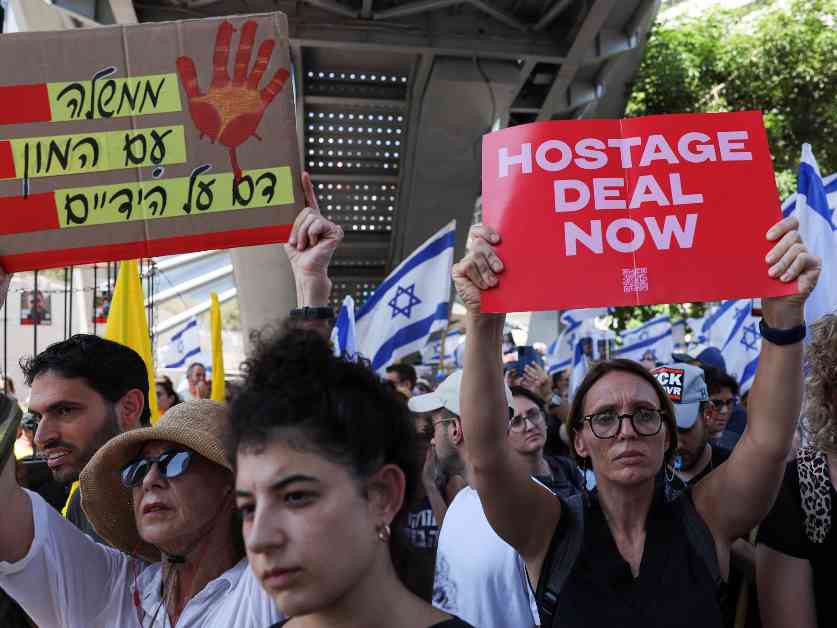Hamas Issues Warning to Israel: Gaza Captives Will Return in Coffins
The armed wing of the Palestinian group Hamas, known as the Qassam Brigades, issued a stern warning to Israel following the recovery of six captives’ bodies from a Gaza tunnel by Israeli forces. The group stated that if Israeli military pressure continues, captives held in Gaza would be returned to Israel “in coffins.” This threat comes amidst escalating tensions between the two sides, with Hamas accusing Israel of hindering any potential prisoners’ exchange deal.
Abu Obeida, the spokesman for the Qassam Brigades, emphasized that Israeli Prime Minister Benjamin Netanyahu’s refusal to negotiate a peaceful resolution would result in the captives being returned to their families as casualties of the conflict. He stated, “Netanyahu’s insistence on freeing the captives through military pressure instead of reaching a deal means they will go back to their families in coffins. Their families have to choose between receiving them dead or alive.”
Furthermore, Obeida warned that new instructions had been given to fighters guarding the captives in case Israeli troops approached. The statement from the Qassam Brigades underscores the group’s determination to resist any attempts by Israel to use military force to achieve its objectives in Gaza.
Netanyahu Blames Hamas for Captives’ Deaths
Responding to the recovery of the captives’ bodies, Israeli Prime Minister Benjamin Netanyahu placed the blame squarely on Hamas, accusing the group of executing the captives. During a televised news conference, Netanyahu expressed regret over the failed efforts to bring the captives back alive, stating, “I ask for your forgiveness for not bringing them back alive. We were close, but we didn’t succeed. Hamas will pay a very heavy price for this.”
Senior Hamas official Izzat al-Risheq refuted Netanyahu’s claims, asserting that the captives were killed in Israeli air strikes. The conflicting narratives from both sides further highlight the deep-seated animosity and mistrust that continue to characterize the Israeli-Palestinian conflict.
Protests Erupt in Israel Over Captives’ Deaths
The recovery of the captives’ bodies sparked widespread protests in Israel, with demonstrators expressing outrage over the loss of life and calling for accountability from the government. Many protesters contended that the captives could have been returned alive if Netanyahu’s administration had pursued a ceasefire agreement with Hamas.
However, political analysts caution that the protests and public anger may not be sufficient to bring about meaningful change in the conflict dynamics. Akiva Eldar noted that despite the nationwide strike and rising discontent, the Israeli government’s reluctance to engage in negotiations remains a significant barrier to resolving the crisis in Gaza.
Ori Goldberg echoed this sentiment, highlighting the government’s defensive posture in the face of mounting criticism. He emphasized the need for momentum to drive progress towards a resolution, underscoring the complex political dynamics at play in the region.
International Response and Calls for Action
Amidst the escalating tensions between Israel and Hamas, US President Joe Biden weighed in on the situation, expressing disappointment with Netanyahu’s handling of the captives’ case. Biden remarked that Netanyahu was not doing enough to secure a deal for their release, signaling a growing rift between the two allies.
Months of negotiations mediated by the United States, Qatar, and Egypt have thus far failed to yield a ceasefire agreement acceptable to both parties. Hamas advocates for an end to the conflict and the withdrawal of Israeli forces from Gaza, while Netanyahu maintains that victory over Hamas is the only path to peace.
Alon Pinkas, a former Israeli ambassador, criticized Netanyahu’s reluctance to pursue a hostage deal or ceasefire, attributing the current crisis to the Prime Minister’s intransigence. Pinkas emphasized the need for decisive action to prevent further loss of life and bring about a lasting resolution to the conflict.
In conclusion, the ongoing tensions between Israel and Hamas underscore the urgent need for diplomatic efforts to de-escalate the situation and prevent further loss of life. The fate of the captives remains a poignant reminder of the human cost of conflict and the imperative of finding a peaceful resolution to the longstanding Israeli-Palestinian dispute.



























